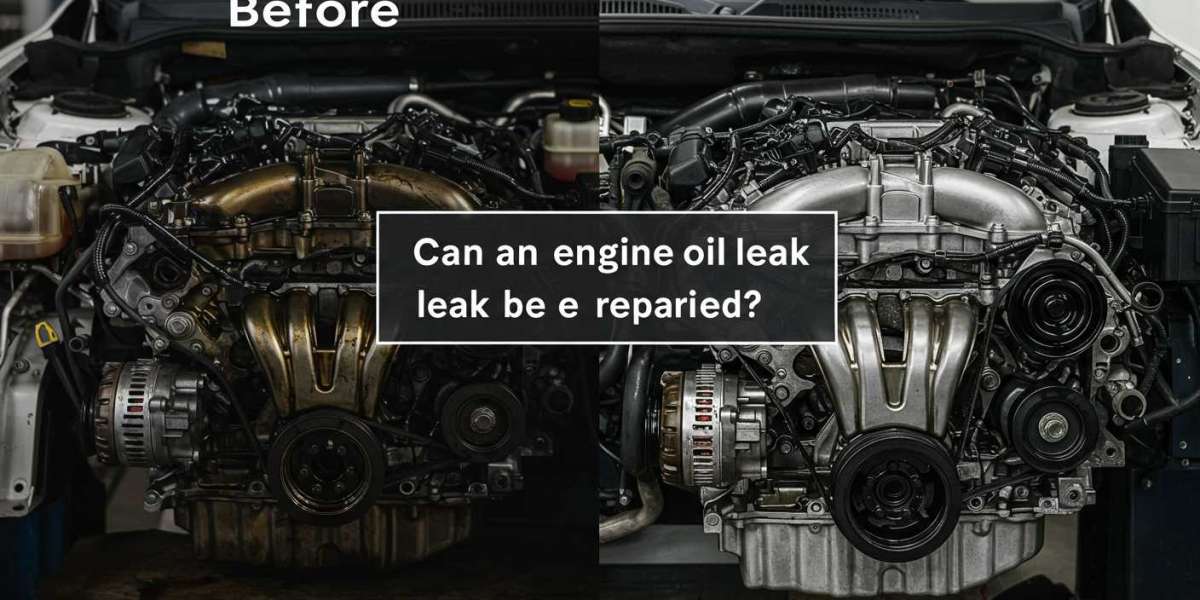Yes, it absolutely can. Whether the issue lies in a worn-out gasket, a cracked seal, or damage to the oil pan, modern repair techniques allow mechanics to restore the integrity of your engine and stop oil from seeping out. The bigger question is how quickly you act. Ignoring even a small oil leak can spiral into costly repairs, while addressing it early ensures your vehicle continues running smoothly.
Engine oil leak repair is more than just stopping a drip on your driveway. It’s about protecting the health of your engine, safeguarding performance, and preventing future damage. In this guide, we’ll explore what causes oil leaks, the common warning signs, the repair process, and how to prevent them from happening again.
What Causes an Engine Oil Leak
Engine oil leaks don’t appear out of nowhere. They often develop gradually due to wear, poor maintenance, or component failure. Some of the most common causes include:
Worn gaskets and seals
Gaskets like the valve cover gasket, oil pan gasket, and head gasket are responsible for keeping oil contained. Over time, exposure to heat and pressure causes them to degrade, crack, or warp.
Damaged oil pan
A collision with road debris or a hard bump can dent or crack the oil pan, creating a path for oil to escape.
Faulty oil filter or drain plug
An improperly tightened oil filter or drain plug can allow oil to leak. Even a worn-out washer on the plug is enough to create a slow leak.
Excessive engine heat
Overheating can break down gasket material and create warping, especially around the head gasket.
Poor installation
If seals or gaskets aren’t fitted correctly, leaks often appear shortly after repair or maintenance work.
Signs You Have an Engine Oil Leak
Spotting an oil leak early is crucial. Here are the key indicators you should look out for:
Oil spots under your car
The most obvious sign. Dark, greasy patches on your driveway or garage floor indicate oil is escaping.
Burning oil smell
If leaking oil lands on hot components like the exhaust manifold, it creates a strong burnt oil odor.
Engine warning light
The oil pressure warning light may come on when oil levels drop. Ignoring this can lead to major engine damage.
Low oil levels
Needing to top up oil more often than usual usually means it’s leaking or burning.
Smoke from the engine bay
Severe leaks can produce visible smoke if oil burns off hot parts of the engine.
How Mechanics Repair an Engine Oil Leak
Engine oil leak repair varies depending on where the leak is located. Professional mechanics usually follow a structured approach to ensure the problem is fully resolved.
Inspection and diagnostics
The process starts with a detailed inspection. Mechanics may use UV dye under a black light to trace the source of the leak.
Gasket and seal replacement
If a gasket or seal is worn, it’s replaced with a new one designed to match your engine’s specifications. Valve cover gaskets and oil pan gaskets are the most common replacements.
Oil pan or drain plug repair
For damaged oil pans, repairs involve resealing or replacing the pan. A stripped or faulty drain plug is replaced to ensure a proper seal.
Head gasket repair
This is one of the more complex repairs, as a failed head gasket can allow oil and coolant to mix. It often requires removing the cylinder head and replacing the gasket with precision.
System testing
After repairs, mechanics run pressure tests and monitor the engine under operating conditions to confirm the leak is fully sealed.
The Risks of Ignoring Oil Leaks
Delaying engine oil leak repair can have severe consequences. Oil is vital for lubrication, cooling, and cleaning engine components. Without sufficient oil, friction increases, components overheat, and the risk of engine seizure rises dramatically. Even a small leak can eventually lead to:
Premature wear of engine parts
Overheating and warped components
Contaminated spark plugs or sensors
Complete engine failure
Taking action early saves time, money, and stress in the long run.
Preventing Future Engine Oil Leaks
Prevention is always better than cure when it comes to engine health. Here are the best practices to reduce the risk of future leaks.
Regular oil changes
Fresh oil reduces sludge buildup and keeps seals in better condition.
Use the correct oil
Always use the oil grade recommended by the manufacturer to prevent excess strain on gaskets and seals.
Routine inspections
Have your mechanic check for early signs of leaks during scheduled services.
Avoid engine overheating
A well-maintained cooling system protects gaskets and seals from heat damage.
Replace parts with quality components
Opt for OEM or high-quality aftermarket gaskets and seals to ensure durability.
Conclusion
Engine oil leaks are more than an inconvenience. They are early warnings that something in your engine needs attention. The good news is that engine oil leak repair is possible and effective, provided it’s done by skilled technicians with the right tools. Acting quickly prevents leaks from escalating into severe engine damage. For drivers who want peace of mind, Schön Automotive is here to provide expert inspection and repair services to keep engines running at their best.
Frequently Asked Questions
Can I drive with an oil leak?
Driving short distances might be possible, but it’s not advisable. Even small leaks can lead to serious engine damage if ignored.
How much does it cost to repair an engine oil leak?
Costs vary depending on the source of the leak. A simple gasket replacement is relatively affordable, while a head gasket repair can be more costly.
What’s the most common cause of oil leaks?
Worn valve cover gaskets and oil pan gaskets are the most frequent culprits.
How do I know if the leak is serious?
If your oil light comes on, if you smell burning oil, or if smoke appears, the leak needs immediate professional attention.
Can oil stop leak additives fix the problem?
Temporary stop-leak products may slow minor leaks, but they’re not a permanent solution. Professional repair is always recommended.



